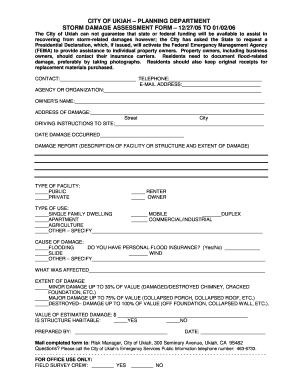Kentucky Facing Storm Damage Assessment Backlog: Here's Why

Table of Contents
Understaffed Teams and Resource Constraints
The sheer volume of damage claims following the recent storms has overwhelmed existing assessment teams, contributing significantly to the Kentucky storm damage assessment backlog. The system is struggling to cope with the unprecedented demand.
- Insufficient number of adjusters and inspectors: The number of trained professionals available to assess the damage is simply insufficient to handle the sheer volume of claims. This shortage is further exacerbated by the fact that many adjusters are already working on pre-existing cases, increasing wait times for those impacted by the recent storms.
- Lack of access to necessary equipment: Proper assessment requires specialized equipment, including drones for aerial surveys of damaged properties and specialized vehicles to access difficult terrain. A shortage of these resources hampers the speed and efficiency of the assessment process.
- Bureaucratic hurdles and complex paperwork: Navigating the intricate paperwork and bureaucratic processes associated with filing insurance claims and obtaining government aid is time-consuming and often frustrating for homeowners. This administrative burden further contributes to the backlog.
- Limited funding for emergency response and assessment initiatives: Insufficient funding allocated to emergency response and assessment efforts means that agencies lack the necessary resources to hire additional personnel, procure equipment, and streamline processes. This lack of funding directly impacts the efficiency of the damage assessment process.
While precise figures are still being compiled, early estimates suggest that tens of thousands of claims have been filed, with only a fraction processed, highlighting the severity of the Kentucky storm damage assessment backlog.
Challenges in Accessing Damaged Areas
Logistical difficulties in reaching remote or severely damaged areas present another significant hurdle in addressing the Kentucky storm damage assessment backlog. Many areas remain inaccessible due to the extent of the damage.
- Road closures and impassable roads hindering access: Extensive road damage, including washed-out bridges and blocked roadways, prevents assessors from reaching many affected properties.
- Damage to infrastructure impacting transportation: Damage to bridges, roads, and other critical infrastructure significantly impacts transportation, making it challenging and time-consuming to reach remote areas.
- Safety concerns for assessors in hazardous conditions: Assessors face safety risks in areas with damaged power lines, unstable structures, and other hazardous conditions, further slowing the assessment process.
- Difficulty in securing necessary permits and permissions for access: Obtaining the necessary permits and permissions to access private property, especially in areas with significant damage, can be a lengthy and bureaucratic process.
For example, several counties in Eastern Kentucky experienced near-total road closures, delaying assessments for weeks in those severely affected communities. The challenges in accessing these areas have significantly exacerbated the Kentucky storm damage assessment backlog.
Complexity of Damage Assessments
Accurately assessing the extent of storm damage is a complex process requiring specialized expertise and meticulous documentation, adding to the existing Kentucky storm damage assessment backlog.
- Need for specialized expertise in various types of damage (structural, electrical, etc.): Damage assessments require experts in various fields, including structural engineering, electrical work, and plumbing, to accurately evaluate the extent of damage to different aspects of a property. This specialized expertise can be scarce in the aftermath of widespread disaster.
- Extensive documentation required for insurance claims and government aid: The process requires extensive documentation, including photographs, detailed descriptions of the damage, and supporting evidence to substantiate claims. This intensive documentation process is time-consuming.
- Challenges in determining the cause of damage and assigning responsibility: Determining whether damage is directly attributable to the storm or pre-existing issues can be challenging and require expert analysis. This often results in delays and disputes.
- Difficulties in separating storm damage from pre-existing issues: Insurance companies and government agencies have stringent criteria for approving aid, and determining the exact cause of the damage is essential to facilitate the claim's approval.
Insurance companies and government agencies play a crucial role in the assessment process, and their capacity and efficiency directly impact the speed at which claims are processed and aid is disbursed.
Technological Limitations
While technology can significantly improve the efficiency of storm damage assessments, limitations in its adoption and implementation are contributing to the Kentucky storm damage assessment backlog.
- Limited use of advanced technologies like drone surveying or AI-powered damage assessment tools: The adoption of advanced technologies, such as drone surveys for rapid damage assessments and AI-powered tools for analyzing images and data, remains limited, slowing down the assessment process.
- Inadequate digital infrastructure in affected areas: Reliable internet access and digital infrastructure are crucial for efficient data collection, sharing, and analysis. The lack of adequate digital infrastructure in many affected areas hampers the use of technology-driven solutions.
- Lack of training for assessors in using new technologies: Many assessors may lack the training and experience needed to effectively utilize new technologies, hindering their ability to perform rapid and accurate assessments.
- Data management and sharing challenges between different agencies: Effective data management and sharing between different government agencies and insurance companies is critical. Without a seamless system, data silos and inconsistencies can significantly delay the assessment process.
Investing in and implementing advanced technologies, along with providing adequate training, could significantly improve efficiency and reduce the Kentucky storm damage assessment backlog.
Conclusion
The Kentucky storm damage assessment backlog is a critical issue stemming from a combination of factors: understaffed assessment teams, logistical challenges in accessing damaged areas, the inherent complexity of damage assessments, and limitations in technology adoption. This situation has a devastating impact on homeowners and businesses struggling to rebuild their lives.
To address this urgent issue, increased resources are needed, including additional personnel, equipment, and funding for emergency response and assessment initiatives. Streamlining bureaucratic processes and embracing advanced technologies like drone surveys and AI-powered assessment tools are essential for expediting storm damage assessments in Kentucky. Improved data management and sharing between agencies are crucial. Furthermore, training assessors in the use of new technologies will significantly improve efficiency.
We urge residents to meticulously document their damage and actively seek assistance from relevant agencies. Contact your elected officials to advocate for increased funding and support for affected communities, working together to reduce the Kentucky storm damage assessment backlog and improve Kentucky's storm damage assessment process. Let's work together to expedite the process and provide much-needed relief to those affected by the recent storms.

Featured Posts
-
 Staycation Surge 20 Increase In Canadian Airbnb Bookings
May 01, 2025
Staycation Surge 20 Increase In Canadian Airbnb Bookings
May 01, 2025 -
 Xrp Etf Latest News And Analysis Following Ripples Legal Victory
May 01, 2025
Xrp Etf Latest News And Analysis Following Ripples Legal Victory
May 01, 2025 -
 Obituary Priscilla Pointer 1923 2023 Actress And Mother Of Amy Irving
May 01, 2025
Obituary Priscilla Pointer 1923 2023 Actress And Mother Of Amy Irving
May 01, 2025 -
 Bharty Ryasty Dhsht Grdy Kshmyr Myn Eyd Pr Khwn Bhaw
May 01, 2025
Bharty Ryasty Dhsht Grdy Kshmyr Myn Eyd Pr Khwn Bhaw
May 01, 2025 -
 Healthcare Experience Management Nrc Healths Klas 1 Ranking
May 01, 2025
Healthcare Experience Management Nrc Healths Klas 1 Ranking
May 01, 2025
